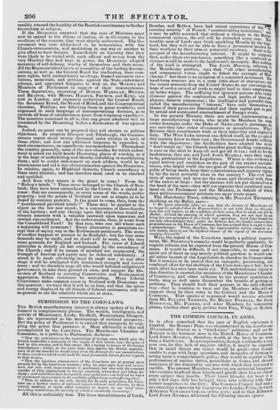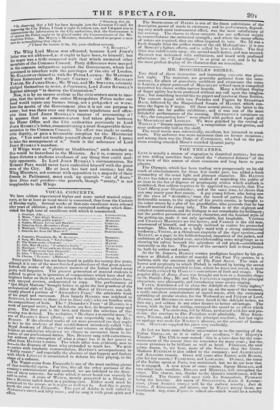THE COMMON COUNCIL IN ARMS.
IT is often remarked that the race of English statesmen is dwarfed. Sir ROBERT PEEL was characterized in the London and Westminster Review as a "third-class" politician ; and yet Sir ROBERT is the furemost man in the British House of Commons. Lord JOHN RUSSELL, therefore, would, at the best, be no more than a fourth-rate. As a compensation, though confessedly a very poor one, for this lack of superior ability, it might be expected that in small things our rulers would be great—that though unable to cope with large questions, and incapable of forming or acting upon a comprehensive policy, they would be regular in the performance of routine duties, punctilious in forms, and stgewd managers of the diminutive matters with which they ventured to meddle. The present Ministers, however, are universal bunglers; who contrive to offend their friends and gratify their foes on almost every subject they handle. Their latest blunder (at least it IS only a few days old) has brought them into collision with their former supporters in the City. The Common Council had undif consideration a measure for improving the London Police, in which Alderman VENABLES took an active part ; and to that Alderman Lord JOHN Rums'. addressed the following laconic epist,e.
" Whitehall, Feb. 23
(tin observing that a bill has been brought into the Common Comacil for proving the City Police, I think it right to inform you, and I request you to :Orrnicate the information to the City authorities, that the Government is of opinion the Police ought to I? placed under the Conimissioners of the Me- tes Police. Her Majesty 8 Ministers, therefore, Intend to propose a mea-
tropoli
sure for accoinplishing that object.
"I have the honour to be, Sir, your obedient servant,
"J. RUSSELL*" The Whig Lord Mayor was affronted, because Lord JOHN'S letter was not addressed, a- it ought to have been, to himself; but his anger was a trifle compared with that which animated other members of the Common Council. Party differences were merged in the common indignation against the Government, which had presumed to interfere with the privileges of the city of London. MT. GALLOWAY chimed in with Sir PETER LAURIE; Sit' MATTHEW WOOD fraternized with Deputy CORNEY ; and Mr. RICHARD TAYLOR, Sir JAMES DUKE, Mr. WIRE, and Mr. STEVENS, solemnly pledged themselves to resist, cl routrance, Lord JOHN RUSSELL'S flagrant attempt "to destroy the Corporation." Now, it is by no means so clear as the civic orators seem to ima- gine, that the union of the entire Metropolitan Police under one bead would injure any human being, not a pickpocket or worse. Into the merits of the Government plan it is not our purpose to enter ; but was there ever any thing more injudicious and offen- sive than Lord JOHN RUSSELL'S manner of announcing it ? It appears that no communication had taken place between the Home Office and the City authorities previously to Lord JOHN RUSSELL'S letter, communicating a most disagreeable deter- mination to the Common Couneii. No effort was made to soothe civic dignity, or gain a favourable reception for the Ministerial plan. "You need not trouble yourself about your Police; I mean to take the management of it.' Such is the substance of Lord JOHN RUSSELL'S mandate.
If Whigs were as "plenty as blackberries," such conduct as
this would be hazardous in the Minister. As it is, common pru- dence dictates a studious avoidance of any thing that could mul- tiply opponents. In Lord JOHN RUSSELL'S circumstances, Sir ROBERT PEEL would never have embroiled himself with the great men of the City. He at least has tact and caution; but the Whig Ministers, not content with opposition to a majority of their friends in Parliament, must cook up quarrels "out of doors." Quos Deus visit perdere —the proverb, though "musty," is not inapplicable to the Whigs



























 Previous page
Previous page